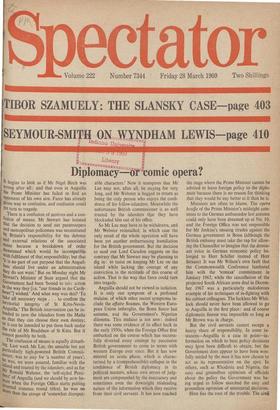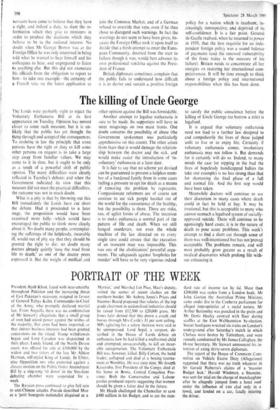Diplomaa=tirlcomic opera?
it begins to look as if Mr Nigel Birch was wrong after all: and that even in Anguilla the Prime Minister has failed to find an Opponent of his own size. Farce has already given way to confusion, and confusion could Yet turn to tragedy. There is a confusion of motives and a con- tusion of means. Mr Stewart has insisted that the decision to send out paratroopers and metropolitan policemen was necessitated by Britain's responsibility for the defence and external relations of the associated Kates because a breakdown of order threatened which would be incompatible `it is fulfilment of that responsibility; but that is no part of our purpose that the Anguil- 'am should live under an administration they do not want.' But on Monday night Mr Stewart's Minister of State argued that the Government had been 'bound to take action in the way they [i.e. "our friends in the Carib- wished.' wished.' And what way was this? `To lake all necessary steps . . . to confirm the territorial integrity of St Kitts-Nevis- Anguilla.' The British intervention can be in- tended to save the islanders from the Mafia an that they can choose their own destiny; nr it can be intended to put them back under the rule of Mr Bradshaw of St Kitts. But it cannot possibly be both. The confusion of means is equally disturb- ing, Last week Mr Lee, the amiable but not Particularly high-powered British Commis- !Inner, was to stay for 'a number of years'; he was, we were assured, familiar with the 'island and trusted by the islanders; and as for eilvir Ronald Webster, the 'self-styled Pres:L.. rne of Anguilla (and we should by now be i'cire when the Foreign Office starts putting able characters.' Now it transpires that Mr Lee may not, after all, be staying for very long, and Mr Webster is begged to return as being the only person who enjoys the confi- dence of his fellow-islanders. Meanwhile the unfortunate British commissioner is so well trusted by the islanders that they have blockaded him out of his office.
So Mr Lee may have to be withdrawn, and Mr Webster reinstalled; in which case the only result of the whole operation will have been yet another embarrassing humiliation for the British government. But the decision to send our Lord Caradon suggests on. the contrary that Mr Stewart may be planning to dig in: to insist on keeping Mr Lee on the island while lacking the courage of any conviction in the rectitude of this course of action. That is the way that farce could turn into tragedy.
Anguilla should not be viewed in isolation. It is only one symptom of a profound malaise, of which other recent symptoms in- clude the affaire Soames, the Western Euro- pean Union imbroglio, the Bonn fiasco last autumn, and the Government's Nigerian dilemma. This malaise is not new : indeed there was some evidence of its effect back in the early 1950s, when the Foreign Office first embarked on the course which has success- fully diverted every attempt by successive British governments to come to terms with western Europe ever since. But it has now entered an acute phase, which is charac- terised by a (comprehensible) collapse in the confidence of British diplomacy in its political masters, whose own errors of judg- ment are compounded by the inaccuracy and sometimes even the downright misleading nature of the information which they receive from their civil servants. It has now reached the stage where the Prime Minister cannot be advised to leave foreign policy to the diplo- mats because there is no reason for thinking that they would be any better at it than he is Ministers are often to, blame. The opera bouge of the Prime Minister's midnight sum- mons to the German ambassador last autumn could only have been dreamed up at No, 10, and the Foreign Office was not responsible for Mr Jenkins's ensuing tirades against the German government in Bonn (although the British embassy must take the rap for allow- ing the Chancellor to imagine that the domin- ant voice in German economic policy be- longed to Herr Schiller instead of Herr Strauss). It was Mr Wilson's own fault that the Commonwealth Conference lumbered him with the NIBMATe commitment in January 1967. while the cancellation of the projected South African arms deal in Decem- ber 1967 was a particularly malodorous example of his techniques of in-fighting with his cabinet colleagues. The luckless Mr Whit- lock should never have been allowed to go to Anguilla in the first place: and of course diplomatic finesse was impossible so long as Mr Brown was in charge.
But the civil servants cannot escape a heavy share of responsibility. In some in- stances—Anguilla is a case in point—in- formation on which to base policy decisions may lave been difficult to obtain; but the Government does appear to have been woe- fully misled by the man it has now chosen to act as its representative on the spot. In others, such as Rhodesia and Nigeria, the easy and groundless optimism of officials about the policy the Government was be- ing urged to follow matched the easy and groundless optimism of ministerial decisions. servants have come to believe that they have a right, and indeed a duty, to slant the in- formation which they give to ministers in order to produce the decisions which they believe to be in the national interest. No doubt when Mr George Brown was at the Foreign Office he was only interested in being told what he wanted to hear himself and his colleagues to hear, and unprepared to listen to anything else. But this did not exonerate his officials from the obligation to report to him—to take one example—the certainty of a French veto on the latest application to join the Common Market, and of a German refusal to override that veto, even if he then chose to disregard such warnings. In fact the warnings do not seem to have been given, be- cause the Foreign Office took it upon itself to decide that a fresh attempt to enter the Euro- pean Community. doomed from the start to failure though it was, would best advance its own professional vendetta against the Presi- dent of France.
British diplomats sometimes complain that the public fails to understand how- difficult it is to devise and sustain a positive foreign policy for a nation which is insolvent, in- creasingly introspective, and deprived of its self-confidence. It is a fair point. General de Gaulle realised, when he returned to power in 1958, that the first requisite for an inde- pendent foreign policy was a sound balance or payments (and the renewed vulnerability of the franc today is the measure of his failure). Britain needs to concentrate all her energies on restoring her international com- petitiveness. It will be time enough to think about a foreign policy and international responsibilities when this has been done.



































 Previous page
Previous page